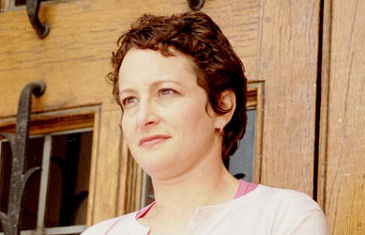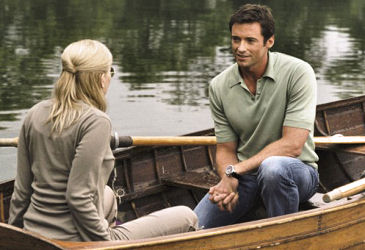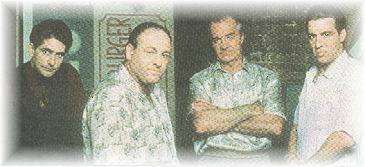The Nina Jacobson-whacked-at-Disney story had been around for about three hours as of 6:04 pm, and Variety had no story up by that time. It turned out that Variety filed at 6:10 pm, although Sheigh Crabtree‘s Hollywood Reporter story went up about 5:15 pm, give or take. News breaks on a minute-by-minute basis these days. And if a news org can’t file within an hour or two of getting the story, they’re bringing up the rear.
Jacobson whacked…what?
This is ridiculous! In the wake of her recent image upgrade as one of the shrewdest and most perceptive studio execs around because she told M. Night Shyamalan that his Lady in the Water script needed work (Michael Bamberger’s description of their disagreement is the most riveting portion of The Man Who Heard Voices) and with hundreds of millions rolling into studio coffers from the recent success of Pirates 2, Disney — of all the times to do this — has axed Nina Jacobson as president of production and replaced her with marketing president Oren Aviv.

Nikki Finke is reporting that “the uber-ambitious Aviv helped set the stage for Nina’s descent (and his ascent) by telling Disney a while ago that Paramount’s Brad Grey had offered him the same position that Gail Berman eventually took.” I rang Jacobson’s office about 45 minutes ago after hearing the news. This is one of the most bizarre and nonsensically out-of-the-blue whackings in Hollywood history. Disney is looking to scale back on feature production and make more family-friendly films. Fine…and the fang-toothed, razor-clawed Aviv is better for the job of cranking these films out than Jacobson?
“The studio is undergoing a major reorganization, and there simply isn’t room for everyone in the new structure,” Jacobson said in a statement. (Yeah, sure thing …there wasn’t “room” for Disney’s whip-smart president of production.) “I love the company and it has been a great honor to be part of building the Walt Disney brand. I’ve had the opportunity to work on films that I love, with filmmakers I admire and colleagues I adore. I’m sorry to go but I am proud of what I’ve left behind, a vibrant movie studio with major franchises and thriving relationships with some of the most talented filmmakers in the world.”
“Scoop” Fails
Todd McCarthy‘s review of Woody Allen‘s Scoop (Focus Features, 8.28) in the 7.16 Variety won’t be lifting anyone’s spirits over at Focus. (Kirk Honeycutt‘s Hollywood Reporter review is a little kinder.)
This McCarthy passage stands out: “Sadly, Allen’s patented harangues and complaints have rarely been more irritating, not only because they sound like barely revised versions of those we’ve heard many times before, but because his broad accent and uncouth manner stand out so conspicuously amid so many well-spoken British thesps.

“Asked with some bemusement by some stiff old Brits about his background, Sid replies, ‘I was born into the Hebrew persuasion, but when I got older I converted to narcissism.’ And yet Allen’s appearance in Scoop belies this: “Looking significantly older than when he last appeared onscreen (in Anything Else three years back), Allen comes off as a disagreeably disgruntled curmudgeon whose wit has curdled.”
Holographic DVDs
This holographic DVD technology was announced eight months ago and I’m just now paying attention. As described here, it sounds so much better and more advanced than Blu Ray or HD-DVD. 1.6 Terabytes per disc means a single disc could hold a dozen high-def movies. I’m sure there’s some tech hurdle I’m overlooking but…
MPAA’s Red Carpet deal
The MPAA movie ratings have been a joke for years (as Kirby Dick’s This Film Has Not Yet Been Rated makes abundantly clear) so why should anyone care about their new Red Carpet Ratings alert? Which will include a weekly email blast that will make it easy for parents to get ratings on their work and home computers or handheld devices, blah, blah. Just remember to see Dick’s film, which IFC is opening on 9.1.06.
No “Snakes” screenings
It’s been decided by New Line brass that the charms of Snakes on a Plane will probably be unappreciated by a sizable percentage of critics and columnists, and therefore no advance media screenings will be held before the 8.18 opening. Because advance reviews, they’ve obviously decided, may do more harm than good. (Which isn’t to say they absolutely will do more harm than good — only that the possibility is giving them concern.) Please mull this one over, HE readers, and tell me you ‘re thinking. Why would New Line make this call with at least some critics (like AICN’s Derek Flint ) likely to be receptive and then some? Do the odds seem to favor Snakes earning its place alongside other classic absurdist horror-thrillers like Tremors or Reanimator? Or is it starting to look more like it might be in the class of Tremors 2?
Sony’s Blu-Ray seems to be gaining ground over Toshiba’s HD-DVD, but why doesn’t an industry strong-man (or a group of strong men?) just step into the situation and slap everyone around like a mafia crime boss would and lay down the law: “It’s Blu-Ray or nothing…or else .” It’s obvious that the high-def format standoff between Blu-Ray and HD-DVD is self-destuctive and killing interest among Average Joe’s in buying a high-def DVD player.

DVD sales are flattening out and an affordable HD-DVD format that catches on could change the whole picture, but it’s not happening because of the stubborn egos of a few men in the industry’s tech arena. This is insane. If Tony Soprano, Chris Moltisanti, Paulie Walnuts and Silvio Dante had any influence over this situation, some limbs and ribs might get bruised or broken but Toshiba’s HD-DVD players would be out of the picture before you know it. And then everyone could start making some money.
Potent head brew
The hallucinogenic tea Oliver Stone was sipping at Manhattan’s Park Regency hotel during last weekend’s World Trade Center junket is called ayahuasca, and apparently it’s a lot more potent than anything typically consumed by movie directors under these circumstances. George Rush ‘s N.Y. Daily News column brought it up, but here’s the Wikipedia lowdown:

Ayahuasca is derived from “a giant Amazonian vine native to the rainforest that contains pharmacologically complex psychoactive infusions” — i.e., natural resins that get you high — that are “used for shamanic, folk-medicinal, and religious purposes.” A good strong cup of the stuff is said to contain DMT, otherwise known as” the powerful hallucinogenic alkaloid N-dimethyltryptamine .”
Crowe meets Corrente
Cinematical is running a story borrowed fron an Australian news service story about Russell Crowe and director Michael Corrente hooking up on a film called The Prince of Providence, a biopic of Bubby Cianci, the colorful (read: unethical but charismatic) mayor of Providence, R.I., who was in and out and up and down over a period of 30 years starting in the mid ’70s and is now doing time for racketeering, conspiracy, extortion, witness tampering and mail fraud charges. Naturally Crowe wants to more or less co-direct the film with Corrente (Federal Hill). “When you’re dealing with a star of this magnitude, he brings in a lot of his own ideas,” Corrente told an Aussie reporter.
Rooting for Night-fall
John Anderson does an M. Night slice-and-dice in this N.Y. Post piece. The neat part is the observation that Hollywood studios and producers are probably “praying for a Night fall” and that “the whole town has turned into a NASCAR event — you know, with onlookers leaning over the railings and hoping for a crash?” and that this coming weekend “Hollywood heavies will head out to see Lady in the Water as if they were going to the Roman Colosseum — to root for the lions.”
Mann, Shyamalan riff
Here’s a think piece by Cahier du Cinema‘s Herve Aubron that’s so French think-piecey it turns into a marble statue with a baguette up its butt as you’re reading it. The premise is that Michael Mann and M. Night Shyamalan have “a shared taste for the lackluster and the dull. The worlds of Mann and Shyamalan are gray because they are limbs. Their occupants are already dead. In Shy, the motif of the phantom persists well beyond the final reversal in The Sixth Sense. In Mann, it is less a question of phantoms than of condemned persons in a hurry to be executed. Already dead, in the sense that their execution is already intended and decided — they run to meet it.” De Niro’s Neil in Heat or Cruise’s Vincent in Collateral may have an inner death-wish thing going on, but their sense of alertness and urban vitality is so acute it’s a contact high.
Giamatti hair issues
Stu VanAirsdale (a.k.a. “the Reeler”) had a moment last night with M. Night Shyamalan at a big-deal Lady in the Water screening at the Museum of Natural History. Naturally, Night is going to deflect and sidestep any questions about all the negative reactions to the film and the book and his alleged ego problems. Nothing new here.
What got me were the two tiny photos of Paul Giamatti. This sounds shallow as hell but I don’t want the poor guy to lose any more hair, and he seems to be doing that. Giamatti has to hold onto that Miles thing — he can’t let himself get too Uriah Heep-y. It’s obviously cool for prominent character actors and stars to have balding or thinning conditions, but the key thing is to not let too much erosion occur so things tip over into flirting-with-egg-bald territory.


Sean Connery is the exception — Gene Hackman is the rule. Hackman has had sparse hair for the last 40 years, but he grimmed up and held on to those 250 or 300 follicles on the top of his head. Same with Jack Nicholson — he kept those sprigs and never went 100% billiard-ball.
In Michael Bamberger‘s “The Man Who Heard Voices” it’s reported that some kind of brief discussion about Giamatti wearing a going-bald wig came up priot to the shooting of Lady, so obviously M. Night Shyamalan gave this issue some thought. It’s not a huge deal, but Giamatti should try and hang on to his Sideways hair for the next 20 or 25 years. Just hold onto it somehow and don’t follow in the footsteps of Kevin Spacey and his constantly expanding Martian forehead in the seven or so years since American Beauty.

